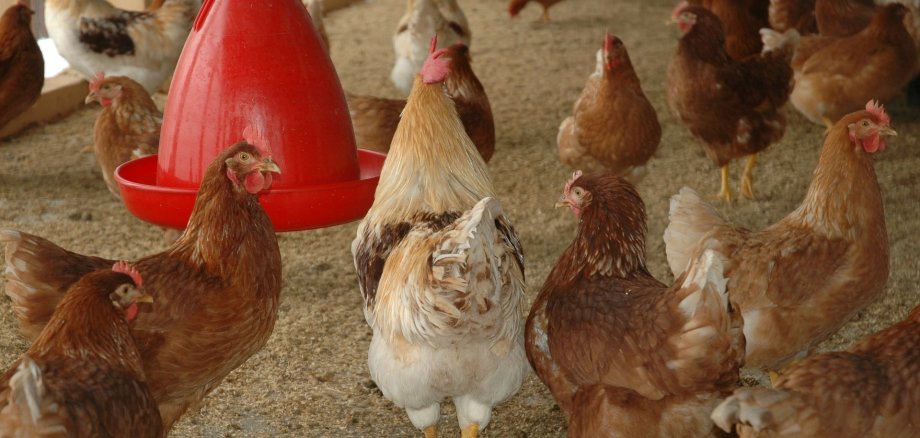Bird flu: County calls on poultry keepers to be cautious
This year, avian influenza is once again present throughout Germany - especially now, when many birds migrate south in autumn. The first case of avian influenza this season in Hesse was recently reported in a poultry farm in the district of Giessen, whereupon all 8,500 birds had to be killed. In order to avoid this in Waldeck-Frankenberg as far as possible, the district is therefore calling on all poultry keepers to exercise caution - and to take certain preventive precautions.
After the virus was detected in a dead wild goose in Waldeck-Frankenberg last winter, infected wild birds are expected to be found again this year. The Friedrich Loeffler Institute also classifies the risk of spread in wild birds and transmission to poultry and kept birds as high. In order to minimise the risk of outbreaks in poultry flocks, the Food Control, Animal Welfare and Veterinary Department of the district therefore appeals to all poultry keepers to strictly adhere to the biosecurity measures in place to protect against the introduction of the virus and to optimise them if necessary.
As a precautionary measure, it is recommended to keep the animals in a closed barn for the time being. Alternatively, they can be allowed to roam in aviaries with a closed solid roof and bird-proof nets or grids on the sides. Direct and indirect contact between domestic and wild birds must be avoided at all costs. In particular, wild birds must not be allowed access to feed, litter and objects that may come into contact with domestic poultry. Poultry must also not drink at water bodies to which wild birds also have access. In addition to compliance with biosecurity measures, it is important that flocks are checked regularly and that only healthy birds are purchased. First cases of illness or even death in poultry should always be clarified by a veterinarian.
In addition, in order to prevent the spread of avian influenza in the event of an outbreak, all poultry keepers who have so far failed to register as such with the district's Food Control, Animal Welfare and Veterinary Service should do so without delay - regardless of how many animals they own. They must also be registered with the Hessische Tierseuchenkasse.
Background
Avian influenza, colloquially known as bird flu, is a particularly severe form of avian influenza (AI) in poultry and other birds. The highly contagious virus is very easily transmitted, so that it can spread very quickly over large areas. Sick animals excrete the pathogen with their faeces and with mucus or fluids from their beaks and eyes. In direct contact, other animals become infected by inhaling or picking up virus-containing material. Furthermore, transmission can also occur through contaminated commodities such as vehicles, equipment or packaging material. Infection leads to an acute disease. Chickens and turkeys are considered particularly susceptible, which can lead to considerable suffering of the animals and high death rates. Avian influenza cannot be treated. Wild birds, especially waterfowl, are considered the natural reservoir.
According to the Robert Koch Institute, there are no known human cases of AI viruses in Germany. Nevertheless, as with all other dead animals, contact with sick or dead wild birds, especially waterfowl or birds of prey, should be avoided and their discovery reported to the district so that they can be recovered and examined as quickly as possible. Dead animals from your own flock should also be stored in such a way that other animals cannot come into contact with the carcasses until they are collected by the rendering service. If several animals of your own herd fall ill or die, this must also be reported to the district. The service can be contacted at 06451 - 743 753.
